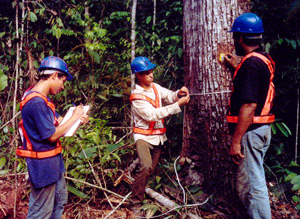Verifying the legality of timber looms as a major issue in the debate over timber certification, judging from the outcomes of an international workshop that convened in Bern, Switzerland last week.
Forest certification is a means of verifying whether a particular forest area is well managed and, through labelling, of assuring consumers that in purchasing labelled wood products they are supporting sustainable forest management (SFM). The idea was proposed more than ten years ago as a way of reducing tropical deforestation; ironically, however, only 5% of the total global area of currently certified forests is located in the tropics.
According to ITTO's Executive Director, Dr Manoel Sobral Filho, there are two principal reasons for this.
"First, virtually all these tropical countries are developing countries facing competing demands for scarce resources. Forests seldom make it to the priority list," he said.
"Second, these countries are dealing with natural tropical forests, where economic, environmental and social requirements for sustainable management are much more complex and demanding than those for non-tropical forests."
Attended by representatives of certification schemes, timber producers and buyers, certification agencies and environmental organizations, the ITTO-funded workshop sought ways of accelerating the certification of tropical timber and timber products.
"There exists in developing tropical countries a considerable gap between the actual level of management and what is required by certification," said Dr Sobral. "It would therefore be grossly unrealistic for these countries to be subjected to the full requirements of certification in one go."
One alternative would be to achieve certification in phases. Under this 'phased approach', full certification would remain the goal but companies and other forest owners would be able to achieve market recognition and benefits as they improve their forest management practices and move towards full certification.
Workshop participants generally agreed that the verification of legal origin could constitute a first phase of a phased approach. However, some also called for the verification of legal compliance, which would require a more in-depth audit of adherence to relevant laws than is typically carried out as part of the forest certification process. Other participants expressed concern that this would constitute a major 'shifting of the goal-posts' for timber-suppliers that would actually hinder their efforts to achieve SFM and certification.
According to ITTO's Amha bin Buang, placing too much emphasis on any specific criterion such as legal compliance runs the risk of losing the holistic nature of SFM.
"It has taken years for tropical countries to become acquainted with SFM and they are now being told that priority should be given to the assurance of legality and some social aspects," he said. "This shift serves more as a distraction from the overriding goal of SFM."
Mr Amha noted that tropical timber-producers want to know the minimum requirements they must meet to enter particular markets, but these vary from country to country and, in many cases, continue to change.
"What tropical timber-producers need most of all is certainty," he said. "Many have made significant strides in improving their forest management, despite the obstacles, and to make new demands on them now could force some out of the market.
"Without a market for their products they have no chance to achieve SFM – and some might be tempted instead to clear their forests for more profitable agricultural production."
A full account of the outcomes of the workshop will be posted on this website in due course.
Legality shapes as new certification flash-point
25 April 2005, Yokohama, Japan

Foresters measure and mark a tree during a pre-felling
inventory in the certified Guavirà forest. Photo: STCP